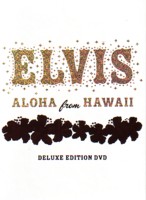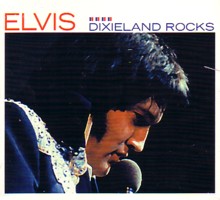'The Night Elvis Reclaimed His Crown'
Spotlight by - Robert Lloyd, LA Times.
|
In summer 1968, Elvis Presley taped a television special to be broadcast that Christmas. Fifteen years earlier, he had walked into Sun Studios in Memphis to make a record as a present for his mother, or so the story goes, and changed history.
"Singer Presents Elvis" is a great moment in music, in television, and in the narrative of his own life -- a moment of change, when what was lost is found again. He regains his voice -- and in so doing becomes at once who he was and who he'll become. His singing has the lilt of youth but with a mature edge. He is 33 years old, lean and chiselled and -- what he had not seemed in years -- a little dangerous. |
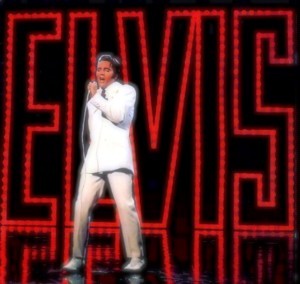 |
In summer 1968, Elvis Presley taped a television special to be broadcast that Christmas. Fifteen years earlier, he had walked into Sun Studios in Memphis to make a record as a present for his mother, or so the story goes, and changed history.
In the years between those events, he had been adored, reviled, imitated, parodied, packaged and finally, if not forgotten exactly -- he was still a working movie star -- then no longer taken quite seriously in a world remade by Bob Dylan, the Beatles and the 20-minute guitar solo.
Elvis went to Hollywood early in his career, but his first films at least, arriving as they did in the era of "Rebel Without a Cause" and "Blackboard Jungle," exploited his actual rock energy and outsider roots; they played melodramatic variations on the story he was already living out.
The movies he made after getting out of the Army in 1960, however, were, with certain rule-proving exceptions, the merest fluff. They have their charms, but by and large they show an Elvis domesticated, marginalized and to all appearances barely interested in music. (Ladies and gentlemen, "Do the Clam.")
And then in one of those confluence of forces that in retrospect looks like fate but is just good timing and good luck, Presley contracted to do a television Christmas special, whose director -- Steve Binder of the pop series "Hullabaloo" and pop film "The T.A.M.I. Show" -- approached it with a sense of mission that happened to accord with the singer's own reported desire to distance himself from the mediocrity of his film career.
What resulted was so clearly a turning point that what was originally known as "Singer Presents Elvis" -- the sewing machine company sponsored it, strangely -- has since almost always been referred to as "The '68 Comeback Special."
It is getting a 40th anniversary really-big-screen showing Friday to open the 25th annual William S. Paley Television Festival, which this year moves to the LA Cinerama Dome.
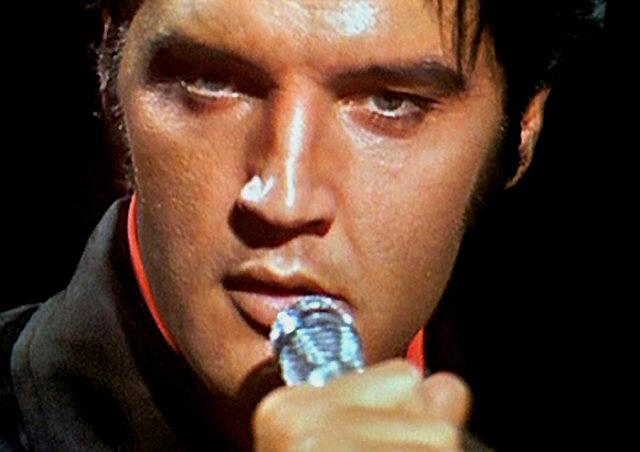
The special begins in darkness, to the sound of a whomping, Muddy Waters-ish blues riff, and then a famous face fades in, turning toward the camera, filling the screen, meaning business.
If you're looking for trouble
You came to the right place
If you're looking for trouble
Just look right in my face
I was born standing up
And talking back
My daddy was a green-eyed mountain jack
I don't know what a "green-eyed mountain jack" is, but as Elvis hits that line his body tenses and quivers, his arm goes straight toward the camera, and there is no doubt that not only is something happening but that something is happening to him.
Television was, of course, central to Presley's early career; he appeared frequently, as a performer and as a curiosity. But he disappeared from the small screen in the 1960s (excepting reruns of his films) and from live performance as well. He was an actor in musical pictures, but less obviously a musician and more and more remote a figure.
But television is a medium of the here and now, and for Elvis to step back into the small screen was for him to engage the world in an intimate and immediate way. (Notwithstanding the six months that elapsed between the taping and the broadcast.)
"Singer Presents Elvis" is a great moment in music, in television, and in the narrative of his own life -- a moment of change, when what was lost is found again. He regains his voice -- and in so doing becomes at once who he was and who he'll become. His singing has the lilt of youth but with a mature edge. He is 33 years old, lean and chiseled and -- what he had not seemed in years -- a little dangerous.
The show is specifically designed to take him back to his roots. In a sequence that would now be called "unplugged," Elvis sits in a circle with guitarist Scotty Moore, who played on his earliest recordings; drummer D.J. Fontana, who came along not long after, keeping time on a guitar case; and some of his Memphis pals. Dressed head to toe in black leather, with a big, head-framing collar costume designer Bill Belew based on paintings of Napoleon, Elvis sweats real sweat as he sings the old songs with new energy.
|
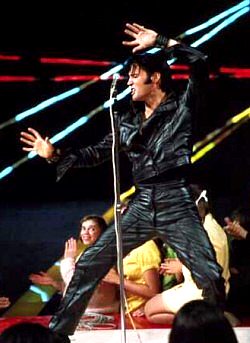 |
It is not all equally a revelation. There are two extensive, heavily choreographed production numbers, energetic but amusingly dated; Elvis, who has marks to hit and pre-recorded vocals to lip sync, is relatively contained. The first is a gospel medley, the second a picaresque adventure built around Johnny Reed's "Guitar Man" that is like an Elvis movie in miniature, with a little sex, some fisticuffs and the singer on the road to stardom.
Getting Elvis a Christmas single seems to have been part of the original deal, and the show was at one point slated to close with him singing "I'll Be Home for Christmas." Instead he closes with a song called "If I Can Dream," a late contribution from vocal arranger Walter Earl Brown -- a plea for peace and understanding that in the murderous year of 1968 had a timely urgency.
Dressed all in white, planted before his name in lights 40 feet high, he folds his body into the song as if in pain, a pain he means to kill with hope.
It is, for all the planning that went into it, as raw and real as any performance I've ever seen. |
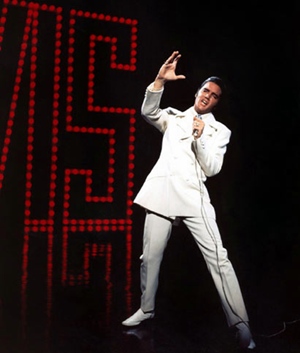 |
It's the beginning of the last phase of Presley's career: He would make his return to live performance in Las Vegas the following July.
If much of what followed look like decline, it was also an apotheosis.
He had nine years to live.
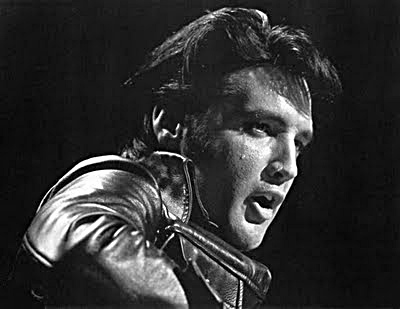
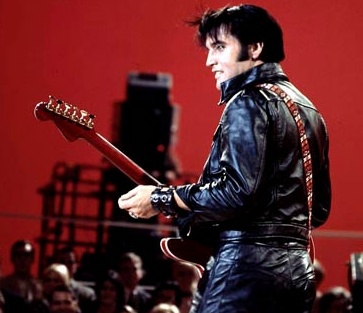
Spotlight by Robert Lloyd, Los Angeles Times Staff Writer
Go here for images and EIN exclusive Spotlight on "The '68 Special - 40th Anniversary Celebration"
| 'The Complete '68 Comeback Special' CD Review: For the 40th Anniversary BMG/SONY release a 4CD "Complete '68 Comeback Special" to the general public. Hard-core Elvis fans have been overly dismissive, pointing out that we have all bought the same product previously. But is this true? Here we not only get the ORIGINAL Album version (The 'Memories' set was a very different compilation) but also something refreshing about the way this new set has been compiled. The second CD itself cleverly leads us from Elvis jamming with the boys on his very first release 'That's All Right' through a fabulous revitalisation of his classic songs all the way to the stunning 'If I Can Dream' which would be his newest single. EIN's Piers Beagley spends a while with Elvis in his gorgeous leather suit. Click here for the in-depth review. (CD Reviews, Source;EIN) |
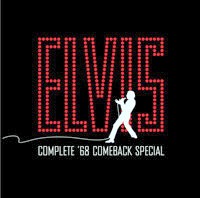 |
|
|



